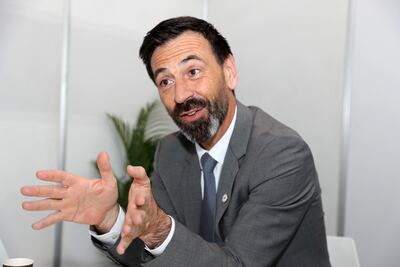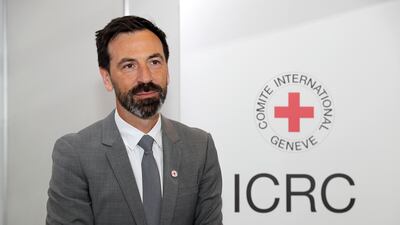Live updates: Follow the latest on Israel-Gaza
The rival sides fighting in Gaza are failing to abide by the international rules of war, which are the only effective instruments available to prevent endless conflict, a senior official of the International Committee of the Red Cross has said.
Fabrizio Carboni, the ICRC's Middle East director, told The National that all parties to any war must respect international humanitarian law, also known as the law of war or law of armed conflict.
“It's in their hands to respect the law of armed conflict. It's in their hands, it's their obligation,” he said in an exclusive interview.
More than 34,200 Palestinians have been killed in Gaza, since Israel launched its offensive.
The Israeli military began its invasion after Hamas-led groups attacked Israel on October 7, killing more than 1,200.
Mr Carboni said the rules of war were not being followed since then.
“State and non-state actors, in my view, are not living up to the law of armed conflict and their basic principles,” he said, speaking on the sidelines of the Dubai International Humanitarian Aid and Development conference.
Despite the rival sides ignoring the rules of war, Mr Carboni said, the legislation is the “best we have.”
“We have no better framework, and it's not because it's not respected that we need to throw it away. But it's the only thing we have,” he said.
“You know, I hear some times that the law of armed conflict died in the rubble of Gaza. I say, what's the alternative? Do you have something else? Do you have another reference?"
If there is no baseline in conflict zones then, “What do we do? We kill each other, non-stop everywhere all the time?” he added.
Mr Carboni said that even in the worst situations of conflict, warring parties must “provide a bare minimum of dignity and respect to people.”

Hostage talks need humanitarian focus
Mr Carboni also called on both Israel and Hamas to see talks over hostages and a ceasefire as a humanitarian issue, not a political or military one.
The ICRC helped facilitate the handover of 105 hostages taken by Hamas on October 7 to Israel, in exchange for the release of 240 Palestinian prisoners from Israeli jails, during a week-long truce in November.
However, several rounds of talks between the two sides have failed to secure another ceasefire and the exchange of the remaining hostages, with Qatari mediators confirming efforts had stalled last week.
Mr Carboni said that the talks had turned away from the issue of the hostages and were now focused on military and political issues.
“It is about military issues and political issues, what I am just seeing today, there seems to be no progress,” he said on the sidelines of the annual humanitarian conference in Dubai.
“Unfortunately, the issue of the hostages is not humanitarian any more, it's not managed as humanitarian. It's about politics, what we observe, for the time being it's going nowhere,” he said.
More than six months after the attack on southern Israel by Hamas, 129 hostages are believed to still be in Gaza, with at least 34 of them confirmed dead.
Mr Carboni said his organisation is ready to take part in a hostage and prisoner exchange if it is agreed.
However, he called for the talks to return to a humanitarian approach.
“What is clear is that, you know, that we are a humanitarian organisation. We don't do this kind of negotiation, where people are not treated as human any more, but are treated as a bargaining chip. We don't do that,” Mr Carboni said.


